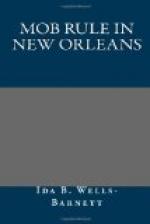In talking to the sergeant about the case, the captain asked about the Negro’s fighting ability, and the sergeant answered that Charles, though he called him Robinson then, was a desperate man, and it would be best to shoot him before he was given a chance to draw his pistol upon any of the officers.
This instruction was given before anybody had been killed, and the only evidence that Charles was a desperate man lay in the fact that he had refused to be beaten over the head by Officer Mora for sitting on a step quietly conversing with a friend. Charles resisted an absolutely unlawful attack, and a gun fight followed. Both Mora and Charles were shot, but because Mora was white and Charles was black, Charles was at once declared to be a desperado, made an outlaw, and subsequently a price put upon his head and the mob authorized to shoot him like a dog, on sight.
The New Orleans Picayune of Wednesday morning said:
But he has gone, perhaps to the swamps, and the disappointment of the bluecoats in not getting the murderer is expressed in their curses, each man swearing that the signal to halt that will be offered Charles will be a shot.
In that same column of the Picayune it was said:
Hundreds of policemen were about; each corner was guarded by a squad, commanded either by a sergeant or a corporal, and every man had the word to shoot the Negro as soon as he was sighted. He was a desperate black and would be given no chance to take more life.
Legal sanction was given to the mob or any man of the mob to kill Charles at sight by the Mayor of New Orleans, who publicly proclaimed a reward of two hundred and fifty dollars, not for the arrest of Charles, not at all, but the reward was offered for Charles’s body, “dead or alive.” The advertisement was as follows:
+$250 REWARD+
Under the authority vested in me by law, I hereby offer, in the name of the city of New Orleans, $250 reward for the capture and delivery, dead or alive, to the authorities of the city, the body of the Negro murderer,
+ROBERT CHARLES+,
who, on Tuesday morning, July 24, shot and killed
Police Captain John T. Day and Patrolman Peter J. Lamb, and wounded
Patrolman August T. Mora.
PAUL CAPDEVIELLE, Mayor
This authority, given by the sergeant to kill Charles on sight, would have been no news to Charles, nor to any colored man in New Orleans, who, for any purpose whatever, even to save his life, raised his hand against a white man. It is now, even as it was in the days of slavery, an unpardonable sin for a Negro to resist a white man, no matter how unjust or unprovoked the white man’s attack may be. Charles knew this, and knowing to be captured meant to be killed, he resolved to sell his life as dearly as possible.




